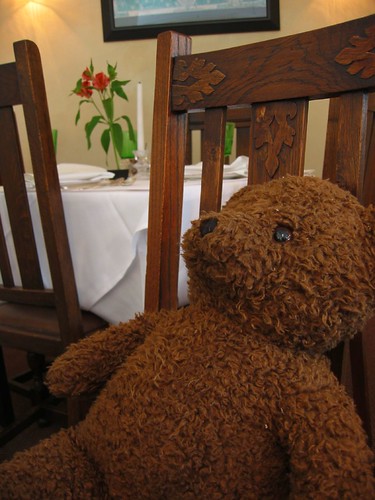
{Photo by rocketlass.}
At one point in War and Peace, Natasha--her surfeit of energy having temporarily trapped her in that odd state common to teens of being simultaneously listless and frenetic--orders her maid, almost inexplicably, to bring her a rooster. By the time the rooster has been located, Natasha has already considered and discarded several other thoughts and activities, and has as little interest in the rooster as would a person brought one out of the blue:
During this conversation, a maid stuck her head in at the back door of the sitting room.But the rooster did serve a purpose: it got me thinking about the animals of War and Peace. My notes make it:
"They've brought the rooster, miss," the girl said in a whisper.
"Never mind, Polya, tell them to take it away," said Natasha.
A bearThe bear, of course, is the greatest of these, costarring with Pierre and Dolokhov in one of the novel's--and Tolstoy's--finest scenes, the debauched night that begins with the bear dancing and ends with it tied to the back of a policeman, floating in the Moika.
Horses
Hunting dogs
A wolf and her cubs
A hare
I can't bear--sorry--to refer to that scene without quoting Pierre's rationalization for being there in the first place after promising his good friend Prince Andrei mere hours before that he wouldn't go near the party:
"It would be nice to go to Kuragin's," he thought. But at once he remembered the word of honor he had given Prince Andrei not to visit Kuragin.Quite. As someone who does not generally give in to impulse when it contradicts earlier plans*, I find myself loving Pierre more at that moment than at any other in all 1,200 pages of War and Peace.
But at once, as happens with so-called characterless people, he desired so passionately to experience again that dissolute life so familiar to him, that he decided to go. And at once the thought occurred to him that the word he had given meant nothing, because before giving his word to Prince Andrei, he had also given Prince Anatole his word that he would be there; finally he thought that all these words of honor were mere conventions, with no definite meaning, especially if you considered that you might die the next day, or something so extraordinary might happen to you that there would no longer be honor or dishonor. That sort of reasoning often came to Pierre, destroying all his decisions and suppositions. He went to Kuragin's.
The bear, meanwhile, brings to mind another, later bear, this one in Penelope Fitzgerald's strange, beautifully written novel of Russia, The Beginning of Spring (1988). I turned to the scene with the bear in that novel tonight and was immediately impressed by how Tolstoyan the bear's backstory feels:
Frank . . . asked her, out of civility, what Mitya's present was. It was a tame bear-cub, or perhaps not tamed, sent dow from the North. The prices of ordinary brown bear fur, for rugs and coats, had gone down terribly since they had put proper heating into the Trans-Siberian railway. Still, this one's mother had been shot for sport by one of Arkady's business contacts and generously he had ordered them to box up the cub and put it on the train for Moscow.Still, I was surprised when later on that same page Fitzgerald made her reference to Tolstoy overt:
Frank had never been much amused by the dancing bear [he recalled from his childhood], nor, as far as he could see, was anyone else. This was only a cub, though. When he got back to Reidka's he told Selwyn what he had arranged, largely for the relief of repeating it aloud. At least he can't make it have anything to do with Tolstoy, he thought. But it turned out that at the New Year Lev Nicolaevich had himself taken the part of the performing bear, wearing a skin which had been lined with canvas. According to Selwyn, this enabled him to give a more spiritual turn to the whole occasion.After reading that I found myself imagining Tolstoy as the author of Bambi . . . oh, what drama he would bring to the forest fire!
No comments:
Post a Comment